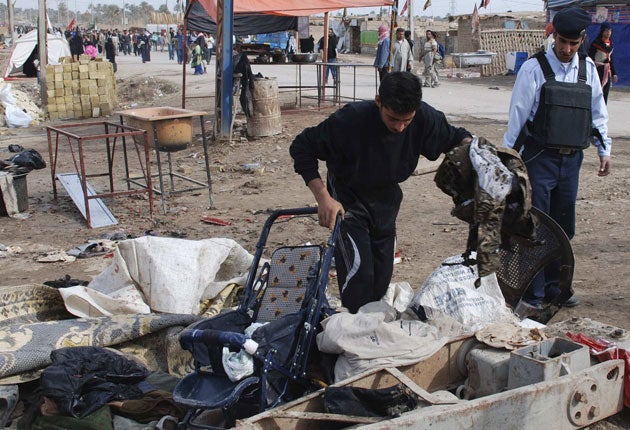Female suicide bomber kills 39 Shia on pilgrimage
Sectarian tensions in Iraq intensify as Maliki seeks to build on election success

A woman suicide bomber blew herself up in the middle of a crowd of Shia pilgrims who were celebrating a religious festival south of Baghdad yesterday, killing 39 and wounding 69 others. The explosion was the latest in a series of attacks in different parts of Iraq which undermine hopes that the country would become less violent as the government re-establishes its authority.
The bombing took place at Iskandariya, 25 miles south of Baghdad, as hundreds of thousands of Shia marched to the holy city of Kerbala to celebrate the festival of Arbain. Female bombers are increasingly used by al-Qa'ida in Iraq because their long black robes make it easier for them to conceal explosives and because male soldiers and police, 40,000 of whom are protecting the pilgrims, are inhibited from searching women.
"We came here for the pilgrimage," said Sadia Ali, who was walking to Kerbala from the Sadr City slum. "We aren't afraid. We've been through worse events in the past." A day earlier another bomber killed eight pilgrims and injured 15 in Kerbala, showing al-Qa'ida still has a network capable of launching sectarian attacks.
The success of Iraqi Prime Minister Nouri al-Maliki – running on a non-religious platform – in coming first in the polls in Baghdad and Basra in the provincial elections on 31 January kindled hopes that secularism and nationalism were beginning to overcome sectarian differences. Recent bombings and shootings show that the Sunni-Shia conflict remains very much alive though casualties are much lower than in the 2005-07 civil war.
In northern Iraq, tension between Arabs and Kurds is increasing in the wake of the election that saw Kurdish control of Nineveh province and its capital Mosul eroded. The Kurds previously had a majority on the local council thanks to a boycott by the Sunni majority in the previous election in 2005. But in the latest poll the Kurds won 31 per cent, about their proportion of the three million population of Nineveh, and al-Hadba, a Sunni Arab coalition dedicated to rolling back Kurdish influence, won 48 per cent.
In the days since the election, there has been a surge of violence. On Monday, four American soldiers and an interpreter were killed by a roadside bomb. Two important local politicians have been assassinated. The latest was Ahmed Fathi al-Jabouri who was walking out of a mosque after evening prayers when a car drew up and a gunman shot him in the head. Elsewhere in the city there have been repeated bomb attacks on police and government installations with heavy loss of life.
Some of this violence is a battle for power within the Sunni community but overall friction between Arabs and Kurds has been growing across northern Iraq in the past six months. The government of Mr Maliki has been sending units of the Iraqi army which are Arab to replace those that are Kurdish in both Kirkuk and Nineveh provinces. This is highly sensitive since the Kurds claim all of Kirkuk and Kurdish parts of Nineveh outside Mosul.
Kurdish leaders do not conceal their anger at Mr Maliki's actions in disputed areas. "There is an effort to move away Kurdish officers above a certain rank," says Safeen Dizayee, a senior official of the Kurdistan Democratic Party led by the Kurdish President Masoud Barzani. He says that last year the Iraqi army's Twelfth Division was moved close to Kirkuk without prior consultation with the Kurds. He adds that Mr Maliki's government is "becoming a one-man show", taking important decisions, such as appointing commanders of the 16 Iraqi army divisions, without consultation with his Kurdish coalition partners.
Mr Maliki's confrontational attitude to the Kurds did him nothing but good with Arab Iraqis in the election. But the Kurds are highly sensitive to any move by non-Kurdish troops into disputed areas which they hope will join their autonomous area, the Kurdish Regional Government, through a referendum as they have long demanded.
Subscribe to Independent Premium to bookmark this article
Want to bookmark your favourite articles and stories to read or reference later? Start your Independent Premium subscription today.

Join our commenting forum
Join thought-provoking conversations, follow other Independent readers and see their replies